|
|
|
Sort Order |
|
|
|
Items / Page
|
|
|
|
|
|
|
| Srl | Item |
| 1 |
ID:
165201


|
|
|
|
|
| Summary/Abstract |
Between 2016 and 2018, Australia’s perceptions of China underwent a significant reality check, with global implications. Australia has been a first mover in pushing back against Chinese foreign interference, including via new foreign influence and interference laws. The recalibration of Australia-China relations, and the events and policy debate that proceeded it, is instructive for other countries seeking to respond to the more assertive and coercive elements of Chinese foreign policy. This article sets out the drivers of Australia's reality check, presents a chronology of key events, and examines how Canberra can now move relations with Beijing forward under the conditions of the new normal that has been established.
|
|
|
|
|
|
|
|
|
|
|
|
|
|
|
|
| 2 |
ID:
165206


|
|
|
|
|
| Summary/Abstract |
Through qualitative comparative analysis of policy documents and official statements over the last 10 years (2008–2018), this paper examines Australian and PRC government conceptions of the international order and the associated policy implications. Their understandings of the international order are informed by their self-defined national role conceptions and perceptions of other states, and are manifested in discussions of institutional reform, international law and human rights. Australia's self-conception as a middle power informs its emphasis on maintenance and US leadership of the existing order, while the PRC's self-conceptions as both a developing and established power enable it to frame itself as either an upholder or reformer of the order. Both governments highlight the ‘rules-based’ mechanisms of the WTO, and are more likely to agree on trade and economic issues than on other matters. Their responses to the 2016 South China Sea arbitration tribunal decision and discussions of the role of human rights in the international order suggest less agreement is likely on international law and human rights norms. While Australia considers the PRC a potential challenger to the existing order, Australia does not feature in PRC discussions of international order, suggesting its limited ability to affect PRC foreign policy decisions.
|
|
|
|
|
|
|
|
|
|
|
|
|
|
|
|
| 3 |
ID:
181939


|
|
|
|
|
| Summary/Abstract |
Debate within Australia regarding the bilateral relationship with China is complex, contentious and often lacks clarity. Informed by basic international relations theory, we identify two dividing lines within this debate. First, whether understanding China’s behaviour is most effectively done through a unitary actor framework, or whether it is essential to look inside the ‘black box’ of the Chinese party-state. Second, whether one is more concerned about the ‘Thucydides trap’ or ‘Munich’—that is, are the consequences of an overreaction or an underreaction more concerning when interpreting China’s intentions and responding to perceived threats. These dividing lines generate four ideal-type policy viewpoints that we label Balancers, Hedgers, Engagers and Reformers, and apply in the Australian context. We then overlay our framework onto the public debate in Australia, selecting a specific bounded case study: commentary and analysis concerning China’s behaviour throughout the COVID-19 pandemic of 2020, in particular responding to Australia’s call for an international inquiry. Our objective is to progress an often circular debate by offering an accessible frame that clarifies and synthesises fundamental disagreements.
|
|
|
|
|
|
|
|
|
|
|
|
|
|
|
|
| 4 |
ID:
185169


|
|
|
|
|
| Summary/Abstract |
Australia has not been alone in declining the opportunity to take part in China's Belt & Road Initiative (BRI). Instead, this article contends, Australia launched its own infrastructure initiative in the Pacific that has attempted to reduce the attractiveness of the BRI to the region. The article focuses on Australia’s intervention in the Coral Sea Cable System, an action which vastly reduced the role of Chinese firms such as Huawei in building telecommunications infrastructure in the Pacific. Informed by a postcolonial perspective, we explain Australia’s stance on the BRI in terms of its intimate but at-times problematic relations with Asia and the Pacific. This was reflected in Australia’s unwillingness to acknowledge the legitimacy of the BRI as a foreign policy initiative, in its invocation of the ‘rules-based order’ to justify its intervention in the cable project, and in the design of its regional infrastructure program, which bore some uncanny resemblances to what Australian policymakers have depicted as the worst aspects of the BRI itself.
|
|
|
|
|
|
|
|
|
|
|
|
|
|
|
|
| 5 |
ID:
178165


|
|
|
|
|
| Summary/Abstract |
Australia—China relations, and especially Chinese influence in Australia, have been the subject of heated debate in Australia since 2016. The central issue is, how to balance concerns over Chinese influence in Australia with the economic benefits of Chinese trade and investment? This study—arguably the first of its kind—answers this question using rigorous empirical modelling. First, it uses Google Trends search results to measure Chinese influence in Australia. Second, it connects Chinese influence, as reflected in Google Trends search results, to financial markets, including stock markets, government bond markets and foreign exchange markets. Weekly data for January 2016–December 2019 are entered into an exponential generalised autoregressive conditional heteroskedastic model. The study finds that the effects of concerns over Chinese influence relate mainly to increased volatility of stock market indices and government bond yields, and downward pressure on the share prices of individual firms that are heavily exposed to Chinese markets. However, the overall effects appear to be minor or insignificant. The implications of these results are that China’s economic coercion (if any) may not be effective, and Australia’s responses to Chinese influence and interference (if any) may generate insignificant costs. Finally, this study makes original and significant academic contributions to academia by providing a novel framework for exploring international relations.
|
|
|
|
|
|
|
|
|
|
|
|
|
|
|
|
|
|
|
|
|